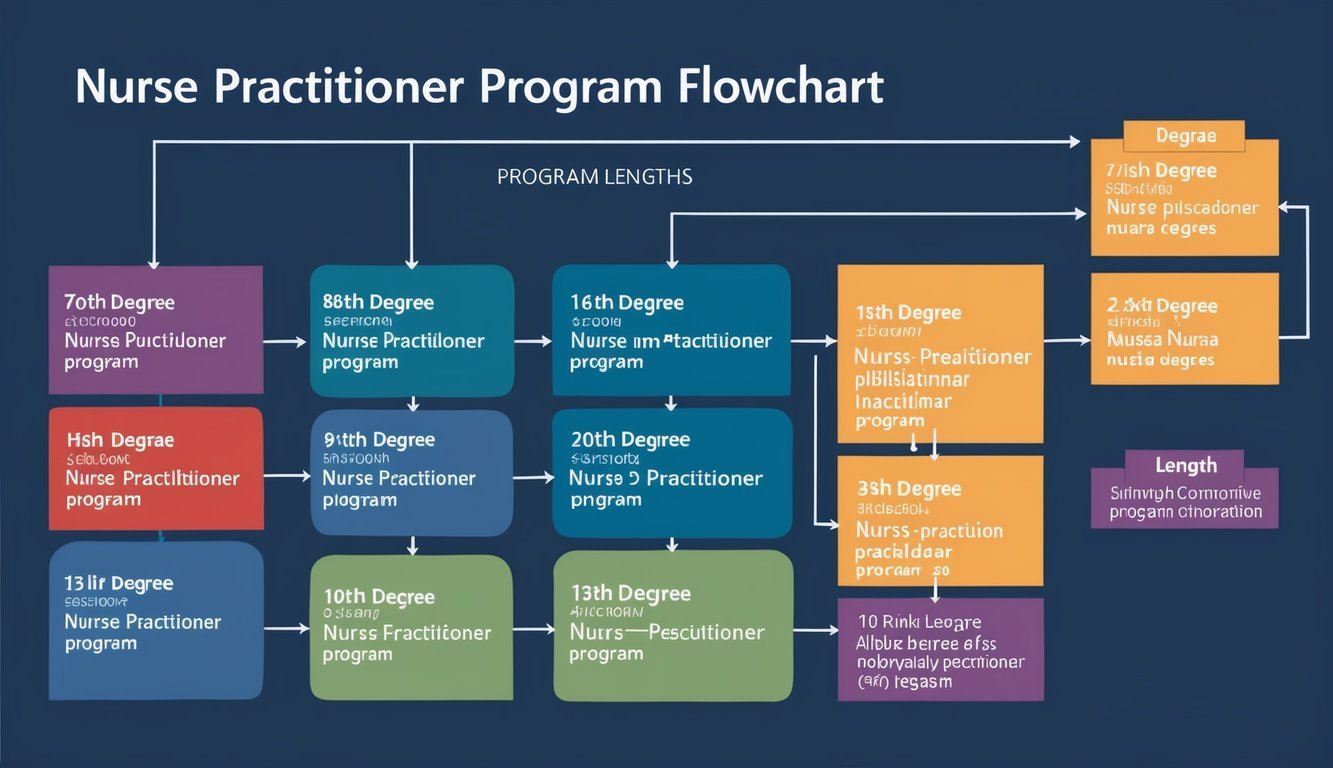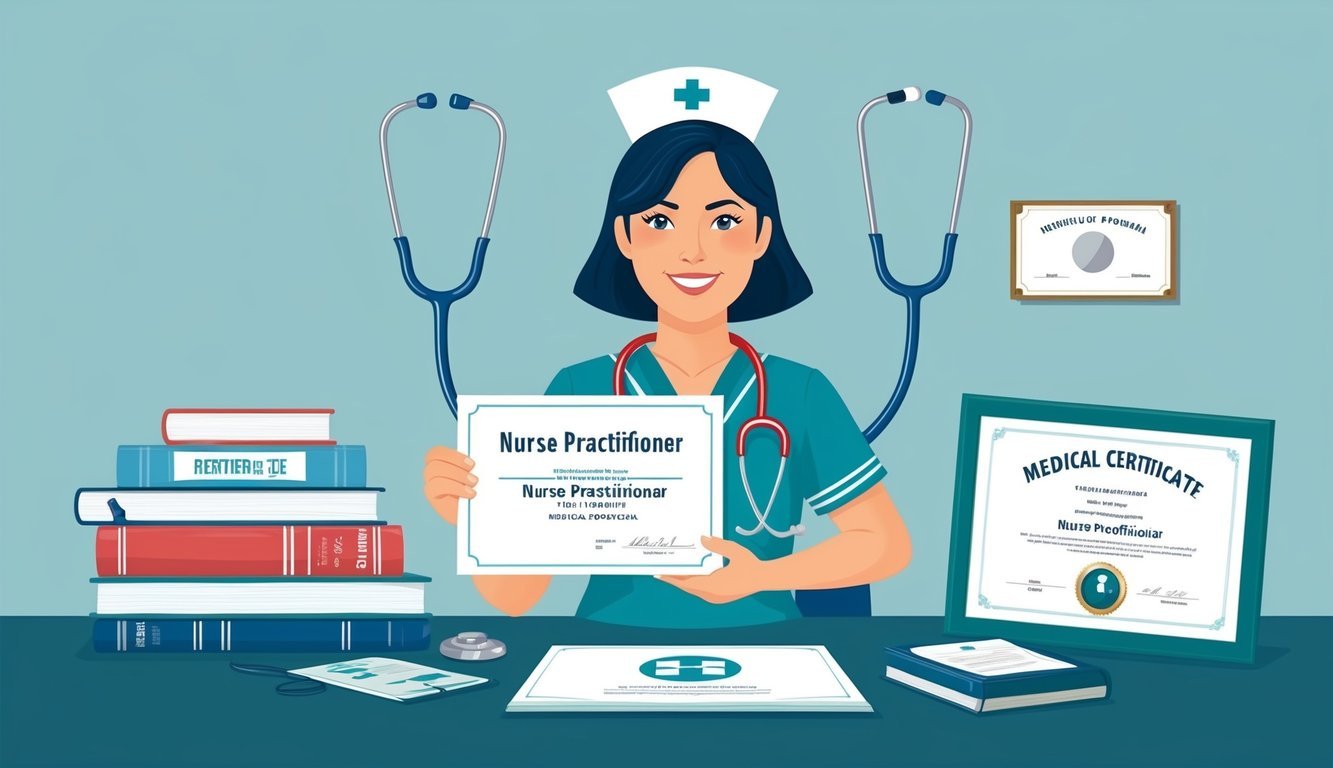Nurse practitioners play an essential role in the healthcare system, often providing primary care and specialized services.
The length of nurse practitioner school typically ranges from six to eight years, depending on your starting qualifications and educational pathway.
This can vary based on whether you pursue an Associate, Bachelor’s, or Master’s degree first.
Choosing the right degree path can greatly affect your journey.
If you are already a registered nurse, you may find that many programs offer an expedited route for you to become a nurse practitioner.
Understanding the educational requirements and various specializations available will help you plan your career effectively.
As you consider this fulfilling profession, knowing the time commitment involved can help you set realistic goals.
With the growing demand for healthcare professionals, your investments in education will pay off in the long run through rewarding career opportunities.
Key Takeaways
- Nurse practitioner school can take between six to eight years to complete.
- Various pathways exist, including Bachelor’s and Master’s degree options.
- Understanding the time commitment is key to planning your career in healthcare.
Overview of Nurse Practitioner Education

Nurse practitioner education focuses on preparing registered nurses to advance their careers by gaining specialized knowledge and skills.
This involves first becoming a registered nurse and then pursuing further education to become a nurse practitioner.
Becoming a Registered Nurse (RN)
To become a registered nurse, you typically start with either an Associate Degree in Nursing (ADN) or a Bachelor of Science in Nursing (BSN).
An ADN program usually takes about two years to complete, while a BSN program generally requires four years of study.
Both paths involve coursework in nursing theories, patient care, and clinical practices.
After completing your degree, you must pass the NCLEX-RN exam to obtain your RN license.
This license is essential to practice as a nurse.
RNs gain valuable hands-on experience in various healthcare settings, which serves as a foundation for advanced practice roles.
Advancing from RN to Nurse Practitioner (NP)
Once you are an RN, you can pursue a Master of Science in Nursing (MSN) or a Doctor of Nursing Practice (DNP) to become a nurse practitioner.
MSN programs typically take 1.5 to 2 years to complete, while DNP programs may take 3 to 4 years.
Admission requirements often include having a strong academic history, active RN licensure, and sometimes a BSN degree.
Most programs involve both theoretical coursework and clinical rotations.
After completing the program, you must pass a national certification exam to obtain your NP license, allowing you to provide advanced care.
For specific program details, consider reviewing options like the Nurse Practitioner Programs.
Degree Pathways and Length of Programs

Understanding the different degree pathways and their respective lengths is essential for aspiring nurse practitioners.
Each pathway offers unique options regarding time commitment and educational background.
Associate Degree in Nursing (ADN) to NP
If you hold an Associate Degree in Nursing (ADN), you can become a nurse practitioner through various programs.
Many ADN graduates choose to enroll in bridge programs that allow them to earn a Bachelor of Science in Nursing (BSN) first.
This typically takes about 1-2 years.
After obtaining your BSN, you can then pursue a Master of Science in Nursing (MSN) or Doctor of Nursing Practice (DNP) to become an NP.
BSN to MSN Programs
For those with a Bachelor of Science in Nursing (BSN), a BSN to MSN program is a common choice.
These programs generally take about 2-3 years to complete.
You will gain advanced clinical skills and knowledge necessary for advanced practice roles.
Many universities offer online options, providing flexibility for working nurses.
Completing an MSN program allows you to specialize in areas such as family practice, pediatrics, or gerontology.
RN to MSN Bridge Programs
Registered Nurses (RNs) without a BSN can opt for RN to MSN bridge programs.
These programs are designed to transition RNs directly into MSN coursework.
Typically, these programs take about 2-3 years to finish, depending on the student’s pace and course load.
You will cover essential nursing and advanced practice courses, making it easier to step into a nurse practitioner role.
Direct-Entry MSN Programs for Non-nurses
For individuals with a non-nursing bachelor’s degree, direct-entry MSN programs are available.
These programs allow non-nurses to enter the nursing field at an advanced level.
They usually last around 3 years and include both BSN and MSN coursework.
This path typically offers an intensive curriculum covering foundational nursing skills and advanced practice nursing.
Completing a direct-entry MSN program leads directly to eligibility for NP certification.
Doctor of Nursing Practice (DNP) Programs
The Doctor of Nursing Practice (DNP) is a terminal degree for nurse practitioners aiming for clinical leadership roles.
DNP programs typically require 3-4 years, particularly for those coming from a BSN background.
DNP programs focus on advanced clinical practice, healthcare policy, and evidence-based practice.
Graduates are well-equipped to address complex healthcare challenges.
Many DNP programs also offer online options, making it easier to balance work and studies.
| Degree Pathway | Typical Length | Notes |
|---|---|---|
| ADN to NP | 3-4 years (total) | Includes BSN bridge before NP program. |
| BSN to MSN | 2-3 years | Advanced practice specialization available. |
| RN to MSN Bridge | 2-3 years | Direct transition for RNs without a BSN. |
| Direct-Entry MSN for Non-nurses | 3 years | Intensive, for individuals without nursing degrees. |
| DNP Programs | 3-4 years | Clinical leadership focus, often online options. |
These pathways provide a clear understanding of how to transition effectively into the nurse practitioner role, based on your current education and career goals.
Licensure, Credentials, and Certification

To practice as a nurse practitioner (NP), you must complete licensure, credentialing, and certification processes.
These essential steps validate your qualifications and ensure you meet state and national standards to provide quality care.
Certification Examination
After completing your NP program, you must pass a certification examination.
This exam is crucial for demonstrating your competency in advanced nursing practices.
You can choose between different organizations for certification, including the American Nurses Credentialing Center (ANCC) or the American Association of Nurse Practitioners (AANP).
Each offers its own certification exams tailored to specific specialties, such as Family NP or Adult-Gerontology NP.
Requirements may vary, so be sure to check the specifics for your chosen path.
Preparing for these exams typically involves reviewing clinical procedures, nursing theory, and ethics in practice.
Licensure as an APRN
To become an Advanced Practice Registered Nurse (APRN), you must obtain a state license after passing your certification examination.
Each state has its own Board of Nursing (BON) that oversees this process.
You will need to submit your certification credentials and proof of your education along with any required fees to the BON.
This may include documentation of your passing the NCLEX-RN, the national exam for registered nurses.
Licensure allows you to practice as an NP and often includes a scope of practice that outlines the types of care you can provide.
State Board Requirements
Each state has unique requirements for licensure.
It’s vital to understand what your specific state board mandates.
Generally, you will need:
- Proof of RN licensure
- Completion of an accredited NP program
- Passing scores on your certification examination
Some states require continuing education credits or renewal fees to maintain your license.
Utilize resources like your state board’s website to stay updated on these requirements.
Explore more at the American Association of Nurse Practitioners for guidance on navigating state board expectations and maintaining your practice credentials.
Specializations within Nurse Practitioner Roles

You can choose from various specializations when pursuing a career as a nurse practitioner (NP).
Each specialty focuses on specific patient needs and healthcare settings.
Below are key roles and what they entail.
Family Nurse Practitioner (FNP)
A Family Nurse Practitioner (FNP) provides primary care to patients of all ages.
FNPs are trained to assess, diagnose, and treat a wide range of health conditions.
They build long-term relationships with families, offering preventive care, chronic disease management, and health education.
FNPs can work in various settings, including clinics, hospitals, and private practices.
They often perform physical exams, order and interpret lab tests, and prescribe medications.
Additionally, they play a key role in health promotion and disease prevention.
To become an FNP, you typically need to complete a Master of Science in Nursing (MSN) or a Doctor of Nursing Practice (DNP) program with a focus on family health.
Many programs require clinical experience in family health settings.
Acute Care Nurse Practitioner
An Acute Care Nurse Practitioner (ACNP) specializes in treating patients with acute or critical conditions.
These nurse practitioners work primarily in emergency rooms, intensive care units, and specialty clinics.
They assess urgent patient needs, develop care plans, and provide immediate interventions.
ACNPs often collaborate with doctors and multidisciplinary teams.
They must be skilled in advanced procedures and emergency care protocols.
The focus is on stabilizing patients, managing complex health problems, and providing effective follow-up care.
To qualify as an ACNP, you generally need an MSN or DNP degree with specialty training in acute care.
Certification through organizations like the American Nurses Credentialing Center (ANCC) is also necessary.
Pediatric Nurse Practitioner
A Pediatric Nurse Practitioner (PNP) focuses on the care of infants, children, and adolescents.
PNPs are trained to diagnose and treat a variety of pediatric illnesses, from common colds to more complex health issues.
They provide routine wellness visits and developmental screenings.
In addition to treatment, PNPs educate families about health, nutrition, and preventive measures.
They often work in pediatric clinics, hospitals, and schools, offering both primary and specialty care.
To pursue this specialty, you will need an MSN or DNP with pediatric training.
Certification is typically required and can be obtained through organizations such as the Pediatric Nursing Certification Board (PNCB).
Psychiatric Mental Health Nurse Practitioner
The Psychiatric Mental Health Nurse Practitioner (PMHNP) specializes in mental health care.
They assess, diagnose, and treat mental health disorders across various settings, including hospitals and outpatient clinics.
PMHNPs provide psychotherapy as well as medication management.
They play a crucial role in addressing mental health needs and improving patient well-being.
Skills in counseling and communication are essential for effective patient care.
Most PMHNPs hold an MSN or DNP and complete a specialization in psychiatric nursing.
Certification through the American Nurses Credentialing Center (ANCC) is often required to practice.
Women’s Health Nurse Practitioner
Women’s Health Nurse Practitioners (WHNPs) concentrate on female reproductive and gynecological health.
They provide care throughout the women’s lifecycle, including prenatal and postnatal care.
WHNPs focus on health education, screenings, and treatments concerning women’s health issues.
Common responsibilities include performing gynecological exams, managing menopause symptoms, and providing family planning services.
WHNPs often work in obstetrics and gynecology clinics, family health practices, and women’s health centers.
To enter this specialty, you need an MSN or DNP focused on women’s health.
Certification from organizations like the National Certification Corporation (NCC) is important for practice.
Job Outlook and Career Progression

As a nurse practitioner (NP), you can expect a positive job outlook and numerous paths for career advancement.
This field has strong employment opportunities, diverse specialties, and a focus on ongoing education to enhance your skills.
Employment Opportunities for NPs
The demand for nurse practitioners is rapidly increasing.
According to the U.S. Bureau of Labor Statistics, they project a 40% growth in NP employment from 2021 to 2031.
This growth is due to several factors, including an aging population and the need for healthcare providers who can deliver quality care.
NPs can work in various settings such as hospitals, clinics, and private practices.
Many are able to establish their own independent practices.
This allows you to provide healthcare services tailored to your community’s needs while emphasizing health promotion and disease prevention.
Potential Career Paths and Specialties
As a nurse practitioner, you have several career paths available.
Some common specialties include:
- Family Nurse Practitioner: Focuses on providing comprehensive care to families.
- Pediatric Nurse Practitioner: Specializes in care for infants, children, and adolescents.
- Geriatric Nurse Practitioner: Works with older adults to manage chronic conditions.
- Mental Health Nurse Practitioner: Addresses mental health issues and provides therapy.
These specialties not only broaden your skills but can also lead to higher earning potential.
Specializing can help you stand out in a competitive job market.
Continuing Education and Lifelong Learning
Continuing education is vital in the ever-evolving healthcare field.
Many states require NPs to complete continuing education credits to maintain licensure.
You can pursue advanced education through various programs, including:
- Certifications in specialized fields
- Doctorate degrees in nursing practice
Staying updated with the latest healthcare trends and practices ensures you remain effective in your role.
Engaging in lifelong learning allows you to enhance your practice and contribute to better patient outcomes.
For more information about educational requirements and resources, visit Nurse.org.
Professional Considerations
In your journey through nurse practitioner school, it’s essential to understand several professional aspects that influence your future practice.
This includes knowing your scope of practice, working collaboratively with other healthcare professionals, and adhering to ethical and legal standards in nursing.
Scope of Practice and Autonomy
As a nurse practitioner, your scope of practice defines the services you can provide.
This varies by state and reflects your qualifications and training.
You often have the autonomy to diagnose, treat, and manage patients independently, which is a significant shift from traditional nursing roles.
This independence allows you to provide personalized care, enhancing patient outcomes.
However, it’s crucial to stay informed about local regulations.
Each state’s Nurse Practice Act outlines what you can and cannot do as a nurse practitioner.
Familiarize yourself with these laws to practice safely and effectively.
Interprofessional Collaboration
Interprofessional collaboration is vital in healthcare.
As a nurse practitioner, you will frequently work with physicians, pharmacists, and other healthcare professionals.
Effective teamwork improves patient care and outcomes.
You should cultivate strong communication skills for this collaboration.
Being able to clearly express your thoughts and consider input from others benefits patient management.
Engaging in team-based care can lead to more comprehensive treatment plans that reflect diverse perspectives and expertise.
Incorporating research and evidence-based practice in discussions can help in decision-making.
This collaboration becomes a pathway for shared learning and professional growth among all team members.
Ethical and Legal Standards in Nursing
Adhering to ethical and legal standards is fundamental in nursing.
These principles guide your actions and decisions in patient care.
You must understand concepts like patient confidentiality, informed consent, and the ethical implications of your choices.
Being knowledgeable about laws governing practice ensures that you comply with state regulations and institutional policies.
Ethical dilemmas may arise, so it’s important to develop your decision-making framework.
Drawing on clinical training and resources on nursing ethics can aid in these situations.
Staying current with nursing informatics can help you navigate the legal landscape, especially relating to patient records and data management.
Utilize resources from organizations like the American Nurses Association for guidance on best practices in ethics.
Frequently Asked Questions
This section addresses common inquiries related to the length and structure of Nurse Practitioner programs, requirements for becoming a Nurse Practitioner, and the distinctions between various roles in healthcare.
How long does it take to complete a Nurse Practitioner program after obtaining a BSN?
After earning a Bachelor of Science in Nursing (BSN), you can expect to spend approximately 1.5 to 2 years in a Nurse Practitioner program.
This time frame may vary by institution and program format, such as full-time or part-time.
What are the duration and structure of Nurse Practitioner programs in the United States?
Nurse Practitioner programs typically last between 15 months to 2 years.
These programs often include both classroom instruction and clinical practice, allowing you to gain hands-on experience in various healthcare settings.
Some universities, like the University of Pennsylvania, offer programs that can be completed in as little as 15 months for full-time students.
What are the requirements and steps to become a Nurse Practitioner in California?
To become a Nurse Practitioner in California, you need to follow these steps:
- Obtain a BSN degree.
- Gain clinical nursing experience (usually 1-2 years).
- Complete a Master’s or Doctorate in Nursing Practice (DNP) program.
- Pass the national certification exam.
- Apply for state licensure through the California Board of Registered Nursing.
How does one transition from a Registered Nurse (RN) to a Nurse Practitioner (NP)?
Transitioning from RN to NP requires additional education.
You need to complete a graduate program, such as a Master’s or DNP, which incorporates advanced nursing practices and specialized training.
After finishing your program, you must pass a national certification exam to practice as an NP.
What distinguishes a Nurse Practitioner (NP) from a Physician Assistant (PA)?
Nurse Practitioners focus on patient care with an emphasis on nursing principles.
They can provide a wide range of healthcare services, including diagnosing and treating illnesses.
Physician Assistants, on the other hand, work under the supervision of a physician and may have a more medical-focused training.
What are the academic and professional differences between a Nurse Practitioner and a Doctor?
Nurse Practitioners typically hold a Master’s or Doctorate in Nursing Practice.
They focus on patient care and holistic approaches.
Doctors, including MDs and DOs, complete medical school and residency programs.
These programs generally require a longer total commitment of time and provide a deeper focus on medical treatment.

